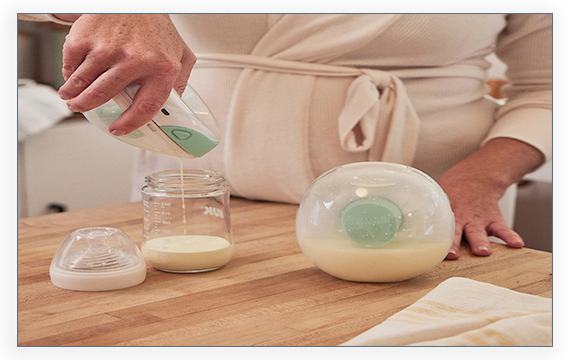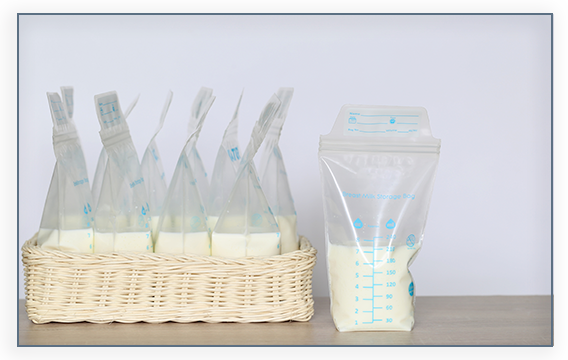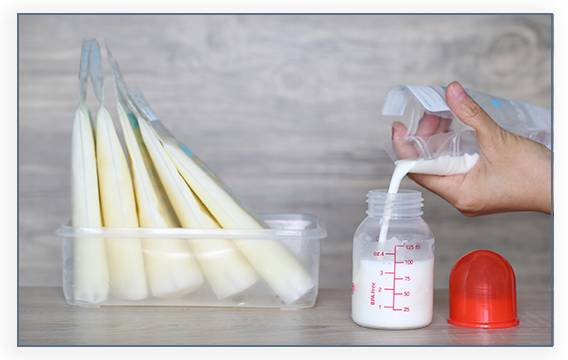Infant Vitamin Supplements
With so much conflicting information out there, you may be wondering if your baby needs a vitamin supplement. The answer depends if your baby is breastfeeding, formula feeding, or a combination of both.

Vitamin D
Vitamin D is a necessary nutrient and hormone. It helps the body absorb and retain calcium and phosphorus, which are critical for building bone. Vitamin D is also needed for immune, endocrine and cardiovascular systems. The American Academy of Pediatricians (AAP) recommends all infants should have a minimum of 400 IU of Vitamin D per day to prevent deficiencies. Human milk only contains about 5-80 IU per liter, therefore breastfed infants or partially breastfed infants should be supplemented with Vitamin D a few days after birth. Breastfed infants are at higher risk for Vitamin D deficiency since human milk is low in Vitamin D.
Below are the recommendations from the American Academy of Pediatricians (AAP) to prevent Vitamin D deficiencies:
• Exclusive or partially breastfed infants should receive 400 IU of Vitamin D daily. Supplementation should continue until at least 12 months old and then be weaned to 32 oz. of infant formula or whole milk per day. Whole milk should not be used until after 12 months of age.
• All formulas sold in the United States have at least 400 IU/L of Vitamin D; therefore, if your baby is drinking at least 32 oz. of formula each day, Vitamin D supplementation is not needed. Whole milk should not be used until after 12 months of age.
• Older children may require supplementation if they are not consuming 32 oz. of whole milk daily, a multivitamin will provide between 300 and 600 IU per serving.
Have more questions? Listen to our FREE podcast!
LISTEN NOWIron
Iron is a mineral the body needs to make hemoglobin, which carries oxygen in red blood cells to all parts of the body. If your child does not have enough iron, his/ her muscles, tissues, and cells will not receive the necessary oxygen needed, which can possibly lead to delayed motor skills or muscle weakness. Iron also supports proper brain development in infancy and early childhood. Symptoms of iron deficiency include tiredness, lack of energy, GI upset, poor memory and concentration, weakened immune system, and inability to control body temperature.
The AAP recommends the following:
• Exclusive or partially breastfed infants: Liquid iron supplement of 1 mg/kg/day until iron-containing solid foods are introduced at about six months of age. If your baby is partially breastfed, the recommendation is the same if more than half the feedings are human milk and the child is not receiving iron-containing complementary foods. Check with your pediatrician about dosage of an iron supplement and the duration of iron supplements during the first year.
• Babies on infant formula: It is recommended that you use iron-fortified formula (containing from 4 to 12 mg of iron) from birth through the entire first year of life.
• Premature babies: Have fewer iron stores and will often need additional iron beyond what they receive from human milk or formula.
The information contained here within is not intended to be a substitute for professional medical advice, diagnosis, or treatment. Always seek the advice of your physician or other qualified health provider with any questions you may have regarding a medical condition. Never disregard professional medical advice or delay in seeking it because of something you have read. If you think you may have a medical emergency, call your doctor, go to the emergency department, or call 911 immediately. Edwards Health Care Services (EHCS) does not recommend or endorse any specific tests, physicians, products, procedures, opinions, or other information that may be mentioned here within. Reliance on any information provided by EHCS, EHCS employees, contracted writers, or medical professionals presenting content for publication here within is solely at your own risk.
Sources:
• https://www.healthychildren.org/English/ages-stages/baby/feeding-nutrition/Pages/Vitamin-Iron-Supplements.aspx
• https://www.healthychildren.org/English/healthy-living/nutrition/Pages/Vitamin-D-Deficiency-and-Rickets.aspx
• https://pediatrics.aappublications.org/content/136/4/625https://lpi.oregonstate.edu/mic/vitamins/vitamin-D
• https://www.healthline.com/health/parenting/iron-supplements-for-kids#1
• https://www.healthychildren.org/English/ages-stages/baby/breastfeeding/Pages/Working-Together-Breastfeeding-and-Solid-Foods.aspx
Tags: Baby, Children, Feeding, Food, Health, Infants, Iron, Newborns, Vitamin D, Vitamins







